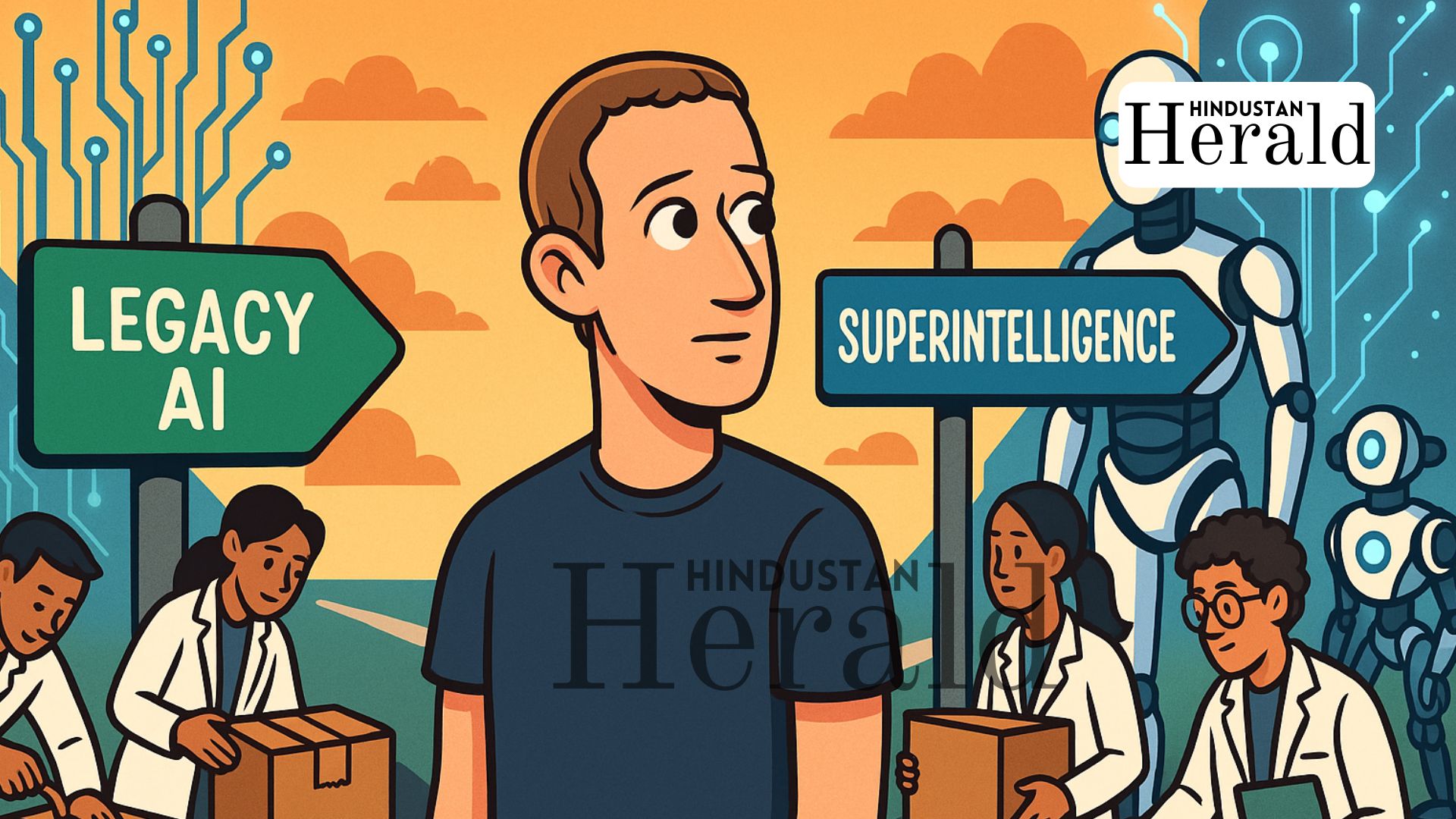Menlo Park, October 23: In a move that caught even long-time employees off guard, Meta Platforms is cutting roughly 600 jobs across its artificial intelligence division, the very heart of the company’s future bets. The layoffs hit some of Meta’s oldest AI teams, including the famed Facebook Artificial Intelligence Research (FAIR) group, product teams, and infrastructure units that once powered its vast recommendation engines and data models.
The cuts are part of a larger internal shift toward something Meta is calling “Superintelligence” , a push led by Chief AI Officer Alexandr Wang that aims to refocus the company on advanced reasoning systems and next-generation AI. For the hundreds of researchers affected, it’s a brutal reminder that in Silicon Valley, even working on the future doesn’t guarantee you’ll be part of it.
Old Guard Out, Superintelligence In
According to Reuters and The Verge, the layoffs are concentrated in Meta’s legacy research teams. Wang’s memo to staff, later obtained by Business Insider, tried to frame the move as a “refinement” rather than a retreat. He wrote about creating “smaller, talent-dense teams” and cutting back on “layers and conversations” that slow down progress.
It’s the kind of language that tends to follow layoffs efficient, polite, and emotionally distant. But what’s really happening is clearer when you zoom out: Meta is consolidating. The company is paring back its older AI operations and pouring resources into the newer Superintelligence Labs, particularly its TBD Lab, which has been untouched by the cuts.
This is where Meta’s most ambitious AI work is now happening efforts to build systems capable of reasoning, understanding, and learning far beyond current generative models. In short, it’s where Zuckerberg wants the company’s future to live.
The Shift No One’s Surprised By
Inside Meta, the writing had been on the wall for months. Ever since the Superintelligence Labs were announced, researchers in the traditional AI groups, especially FAIR, felt sidelined. “You could sense the energy shifting,” said one former researcher who left earlier this year. “Everything became about the new labs. FAIR suddenly looked like the past.”
That said, the layoffs still sting. As AP News reported, employees were told they could apply for internal roles, though few expect many to open up. Most new listings require deep expertise in the kind of cutting-edge model work being done at the Superintelligence division.
What makes this moment complicated is the contradiction it presents. Meta is cutting hundreds of AI jobs while simultaneously hiring aggressively for new ones just in different places, with different priorities. It’s a strange mix of contraction and expansion, one that says a lot about where the industry is headed.
A Company Rewriting Its Own Playbook
Meta’s reasoning is familiar to anyone who has followed Silicon Valley’s rhythms: go lean, go fast, and chase the next breakthrough. According to Investopedia, the restructuring is meant to “streamline decision-making and strengthen impact.”
But this is about more than speed. For years, Meta has been trying to shake off the perception that its AI work lagged behind OpenAI or Google DeepMind. The company has spent billions training massive language and multimodal models, yet its most visible AI products like chatbots and content-ranking systems, haven’t quite sparked the same excitement as rivals.
By centralizing its AI talent into a single, high-stakes unit, Meta is effectively betting the house on the promise of “superintelligence.” It’s a gamble that could either redefine the company or leave it thinner and more fragmented than before.
Industry watchers say this kind of restructuring is becoming the new norm. “Meta isn’t scaling back, it’s consolidating power,” said an analyst quoted by TechCrunch. “Big tech is realising that big teams don’t always build big ideas.”
Behind the Corporate Language, Real Lives Shift
What corporate memos rarely capture are the lives they upend. Many of the people affected helped build Meta’s early AI breakthroughs, recommendation systems, data compression tools, and fairness models that still underpin the company’s platforms.
A few employees have taken to internal forums expressing frustration that the company is chasing an undefined vision of “superintelligence” while cutting teams that made tangible, production-level tools. One researcher reportedly called it “a pivot away from science toward hype.”
According to The Times of India, Wang’s memo included a line meant to soften the blow: “By reducing the size of our team, each person will have more impact.” But inside tech circles, that phrase has become something of a cliché corporate shorthand for doing more with less.
What It Means for Meta and for Everyone Else
Beyond the immediate job losses, the layoffs reflect a broader reality across the tech industry. The AI boom that began in 2022 was fueled by a rush to hire anyone with even the most basic machine-learning experience. Now, as that wave settles, companies are realising they built structures too big to move quickly.
Meta’s decision mirrors similar moves at Google, Amazon, and Microsoft, all of which have quietly trimmed older AI or data teams this year. The new focus is on fewer people, faster cycles, and higher stakes. As The Economic Times put it, this is “AI’s second restructuring era less about scale, more about direction.”
For Meta, that direction is clear: toward next-generation AI that can reason, act, and create. The challenge is whether the company can make that leap without losing the institutional memory and stability that older teams provided.
There’s also a human cost that no amount of innovation talk can hide. A layoff in a lab isn’t just about code or experiments, it’s about relationships, mentorships, and the quiet collaboration that fuels genuine breakthroughs. When you lose that, even the most ambitious projects risk losing their grounding.
A Future Written in Uncertainty
Meta insists this restructuring will help it move faster. In Wang’s closing lines to staff, he wrote, “This is not about doing less, it’s about doing the most important things better.” It’s a neat turn of phrase, but one that leaves room for interpretation.
For now, Meta continues to hire for its Superintelligence Labs, with postings for roles in reasoning systems, alignment research, and multimodal learning. Whether this new direction delivers real innovation or simply reshuffles the same ambitions remains to be seen.
What’s clear is that Meta’s AI story, once defined by sprawling research labs and long-term science, is being rewritten into something leaner, faster, and more uncertain. For those still inside, it’s a chance to help shape that new story. For those just laid off, it’s a reminder that even in the age of artificial intelligence, the most unpredictable variable is still the human one.
Stay ahead with Hindustan Herald — bringing you trusted news, sharp analysis, and stories that matter across Politics, Business, Technology, Sports, Entertainment, Lifestyle, and more.
Connect with us on Facebook, Instagram, X (Twitter), LinkedIn, YouTube, and join our Telegram community @hindustanherald for real-time updates.
Tech writer passionate about AI, startups, and the digital economy, blending industry insights with storytelling.






